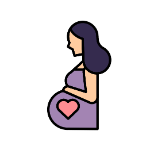
Postpertum Care
How To Take Care Of Your Skin After Delivery
8 min | Updated on 30-03-2023 by HappyPreggie
A woman goes through a lot of mental and physical changes while introducing a new life into the world. During and after pregnancy, your hair and skin health, in particular, undergo significant changes. Returning to regular life might feel like a distant dream at times.

(Image credits to Canva)
But there's some good news: none of these changes are permanent. With a little self-care, women may return to looking and feeling like their pre-pregnancy selves in no time. This article seeks to detail the physical changes women notice in their skin during pregnancy and how to combat them with self-care.

(Image credits to Parents)
Stretch marks appear in numerous places of women's bodies after birth as a result of their increased weight and subsequent decrease. These stretch marks will not go completely, but they will fade with time. They will be pink, purple, or reddish-brown in color at first. The pigmentation will fade with time, making them appear lighter.

(Image credits to MedicineNet)
The increased amount of pregnancy hormones in the body causes this shift in pigmentation. After pregnancy, these hormones progressively disappear. While some brown areas may fade away, others may remain on the skin. Anyone suffering from this illness should stay out of the sun as much as possible.
The stress of motherhood can have a negative impact on your skin. One of them is the appearance of brownish patches. To keep these black spots from becoming worse, treat your skin gently and wash it twice a day with a light cleanser.
Hormonal changes, as well as lack of sleep after childbirth, cause dark circles and swollen eyes. Your eyes reflect the exhaustion that your body feels after giving birth. Constantly waking up to feed the baby leads to a lack of sleep, which results in dark circles.

(Image credits to GoodRx)
Acne outbreaks are fairly prevalent during and after pregnancy. Pimples might come out as a result of high progesterone levels after pregnancy. This may come as a shock to you if you've had clean skin throughout your pregnancy.

(Image credits to Canva)
Many of you may have sensitive skin as a result of your pregnancy. Anything might produce a negative reaction in your skin. Even a small amount of sun exposure, for example, can cause the skin to burn. Some chemicals, such as chlorine and detergent, might irritate your skin.
We understand that as a new mother your first priority is to ensure that your baby stays happy and healthy. However, this should not be used as an excuse to neglect your health. Take a shower at least once a day, and make sure you wash your face twice a day. Use a clean soft cloth to wipe your skin gently to eliminate all impurities.

(Image credits to Allure)
While it's important to keep your skin clean, you shouldn't wash your face too often. This will deprive your face of all required oils, prompting your skin to overproduce oil to compensate for the portion that has been removed.
You will have to work for great skin; it will not happen overnight or without any effort. Remember how, before you were pregnant, you couldn't go a day without doing your complete makeup routine? This isn't going to alter simply because you've had a child.
Start by cleaning your skin every day – preferably twice a day – and work your way back into an organized skincare routine. Because your skin is quite sensitive at this stage, you might choose to apply a soothing and moderate cleanser.
Dead skin will ultimately flake away, clogging your pores. This is why you should scrub your skin at least once or twice a week to exfoliate it. If you want a delicate, smooth complexion that looks like your baby's, try including this into your evening routine once in a while.

(Image credits to Insider)
You might also want to invest in a body scrub made with natural components rather than one made with chemicals. It will increase your blood circulation if you apply it to your skin in circular motions using a loofah.
After giving delivery, many women have hyperpigmentation or dark patches. Melasma will usually disappear on its own after you've given birth, although it may take a while in some situations. Given that exposure to the sun may aggravate those black spots, you may wish to invest in a wide-ranging sun protection skincare product. A product with an SPF 30+ should work, but the greater the number, the better. You may believe that getting a tan can hide those dark spots, but it might really make them worse.
We understand how tough it is to get adequate sleep as a new mother. Late-night feedings, workdays, housework, and struggling to get your kid to sleep again at 3 a.m. can all cause skin problems after pregnancy.

(Image credits to Canva)
Your skin goes into "self-repair mode" as you sleep, trying to appear its best for the next day. It's also why we utilize the majority of our skincare products at night before we go to bed. While you may not be able to sleep when you want since your baby needs your attention, you should have as much rest as possible. "Sleep when the baby sleeps," as the saying goes.
Drinking at least 8 glasses of water every day might help you maintain good skin. This will hydrate your skin from the inside out and help you maintain your skin's resilience. Dehydration is to blame for the majority of your acne and skin problems, so make sure you stay hydrated.

(Image credits Canva)
Furthermore, drinking enough water will help to strengthen your liver and keep your hormones in check. This is a real issue for many women who have just given birth.
Exercising is one of the most effective ways to eliminate toxins from your body as well as relieve at least some tension. Yoga is one of the best ways to achieve beautiful skin after pregnancy since it teaches you how to breathe properly. It will also calm your body so that it no longer feels the urge to react to stress at the first symptom.
Plus, yoga has a way of putting you in a pleasant mood while keeping you away from the world's negativity. Happiness emanates from inside, and it will manifest itself on your skin.

(Image credits to Canva)
Our food is to blame for the majority of our skin issues, so pay close attention to what you consume. You may no longer be pregnant, but that doesn't mean you should start eating junk food. This will just make your skin oily and fill your body with toxins, which you can deduct is not healthy for your skin.
We hope you loved reading our article on How to Take Care Of Your Skin After Delivery and got some insightful information. Visit HappyPreggie to get more amazing articles. In the meantime, you can also read A Complete List Of Postpartum Care Essentials For Recovery or How To Get Rid Of Postpartum Depression.
(Image credits to Canva)
But there's some good news: none of these changes are permanent. With a little self-care, women may return to looking and feeling like their pre-pregnancy selves in no time. This article seeks to detail the physical changes women notice in their skin during pregnancy and how to combat them with self-care.
Common Skin Issues After Delivery
#1 Stretch Marks
(Image credits to Parents)
Stretch marks appear in numerous places of women's bodies after birth as a result of their increased weight and subsequent decrease. These stretch marks will not go completely, but they will fade with time. They will be pink, purple, or reddish-brown in color at first. The pigmentation will fade with time, making them appear lighter.
#2 Melasma
Melasma is a skin condition that manifests itself as brown or blue-gray patches or freckle-like spots on the skin. It's commonly referred to as the "pregnancy mask." Dark spots on the face might appear during pregnancy. Chloasma and melasma are two terms for the same thing.
(Image credits to MedicineNet)
The increased amount of pregnancy hormones in the body causes this shift in pigmentation. After pregnancy, these hormones progressively disappear. While some brown areas may fade away, others may remain on the skin. Anyone suffering from this illness should stay out of the sun as much as possible.
#3 Dark Spots
The stress of motherhood can have a negative impact on your skin. One of them is the appearance of brownish patches. To keep these black spots from becoming worse, treat your skin gently and wash it twice a day with a light cleanser.
#4 Dark Circles
Hormonal changes, as well as lack of sleep after childbirth, cause dark circles and swollen eyes. Your eyes reflect the exhaustion that your body feels after giving birth. Constantly waking up to feed the baby leads to a lack of sleep, which results in dark circles.
#5 Acne
(Image credits to GoodRx)
Acne outbreaks are fairly prevalent during and after pregnancy. Pimples might come out as a result of high progesterone levels after pregnancy. This may come as a shock to you if you've had clean skin throughout your pregnancy.
#6 Hypersensitivity
(Image credits to Canva)
Many of you may have sensitive skin as a result of your pregnancy. Anything might produce a negative reaction in your skin. Even a small amount of sun exposure, for example, can cause the skin to burn. Some chemicals, such as chlorine and detergent, might irritate your skin.
8 Easy Steps To Take Care Of Your Skin
#1 Wash your skin regularly
We understand that as a new mother your first priority is to ensure that your baby stays happy and healthy. However, this should not be used as an excuse to neglect your health. Take a shower at least once a day, and make sure you wash your face twice a day. Use a clean soft cloth to wipe your skin gently to eliminate all impurities.
(Image credits to Allure)
While it's important to keep your skin clean, you shouldn't wash your face too often. This will deprive your face of all required oils, prompting your skin to overproduce oil to compensate for the portion that has been removed.
#2 Cleanse your skin
You will have to work for great skin; it will not happen overnight or without any effort. Remember how, before you were pregnant, you couldn't go a day without doing your complete makeup routine? This isn't going to alter simply because you've had a child.
Start by cleaning your skin every day – preferably twice a day – and work your way back into an organized skincare routine. Because your skin is quite sensitive at this stage, you might choose to apply a soothing and moderate cleanser.
#3 Exfoliate
Dead skin will ultimately flake away, clogging your pores. This is why you should scrub your skin at least once or twice a week to exfoliate it. If you want a delicate, smooth complexion that looks like your baby's, try including this into your evening routine once in a while.
(Image credits to Insider)
#4 Use broad-spectrum SPF
After giving delivery, many women have hyperpigmentation or dark patches. Melasma will usually disappear on its own after you've given birth, although it may take a while in some situations. Given that exposure to the sun may aggravate those black spots, you may wish to invest in a wide-ranging sun protection skincare product. A product with an SPF 30+ should work, but the greater the number, the better. You may believe that getting a tan can hide those dark spots, but it might really make them worse.
#5 Get rest
We understand how tough it is to get adequate sleep as a new mother. Late-night feedings, workdays, housework, and struggling to get your kid to sleep again at 3 a.m. can all cause skin problems after pregnancy.
(Image credits to Canva)
Your skin goes into "self-repair mode" as you sleep, trying to appear its best for the next day. It's also why we utilize the majority of our skincare products at night before we go to bed. While you may not be able to sleep when you want since your baby needs your attention, you should have as much rest as possible. "Sleep when the baby sleeps," as the saying goes.
#6 Drink lots of water
Drinking at least 8 glasses of water every day might help you maintain good skin. This will hydrate your skin from the inside out and help you maintain your skin's resilience. Dehydration is to blame for the majority of your acne and skin problems, so make sure you stay hydrated.
(Image credits Canva)
Furthermore, drinking enough water will help to strengthen your liver and keep your hormones in check. This is a real issue for many women who have just given birth.
#7 Do yoga
Exercising is one of the most effective ways to eliminate toxins from your body as well as relieve at least some tension. Yoga is one of the best ways to achieve beautiful skin after pregnancy since it teaches you how to breathe properly. It will also calm your body so that it no longer feels the urge to react to stress at the first symptom.
Plus, yoga has a way of putting you in a pleasant mood while keeping you away from the world's negativity. Happiness emanates from inside, and it will manifest itself on your skin.
#8 Change in diet
(Image credits to Canva)
Our food is to blame for the majority of our skin issues, so pay close attention to what you consume. You may no longer be pregnant, but that doesn't mean you should start eating junk food. This will just make your skin oily and fill your body with toxins, which you can deduct is not healthy for your skin.
We hope you loved reading our article on How to Take Care Of Your Skin After Delivery and got some insightful information. Visit HappyPreggie to get more amazing articles. In the meantime, you can also read A Complete List Of Postpartum Care Essentials For Recovery or How To Get Rid Of Postpartum Depression.
Join the largest support network for family health and well-being. Ready to get started?
Get started
















